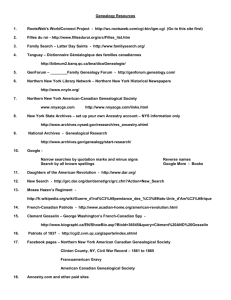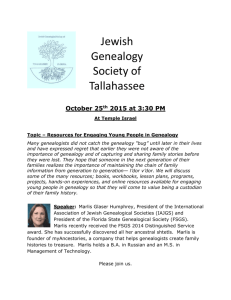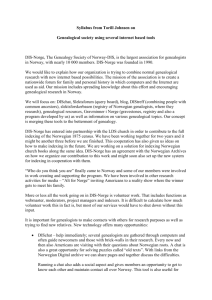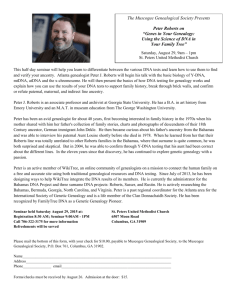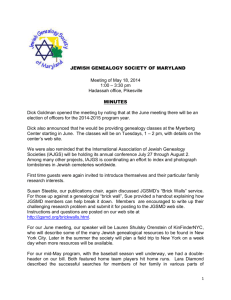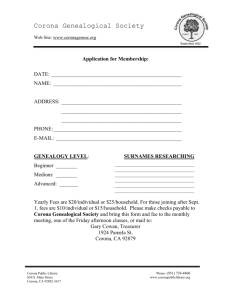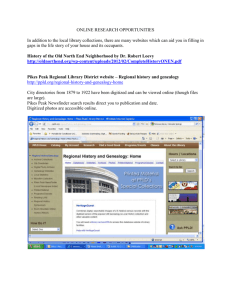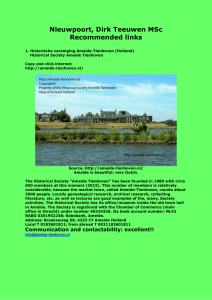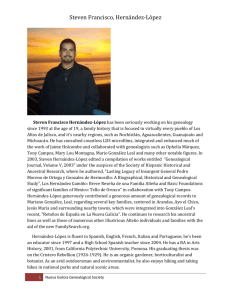Intro to Genealogy Lesson Plan
advertisement
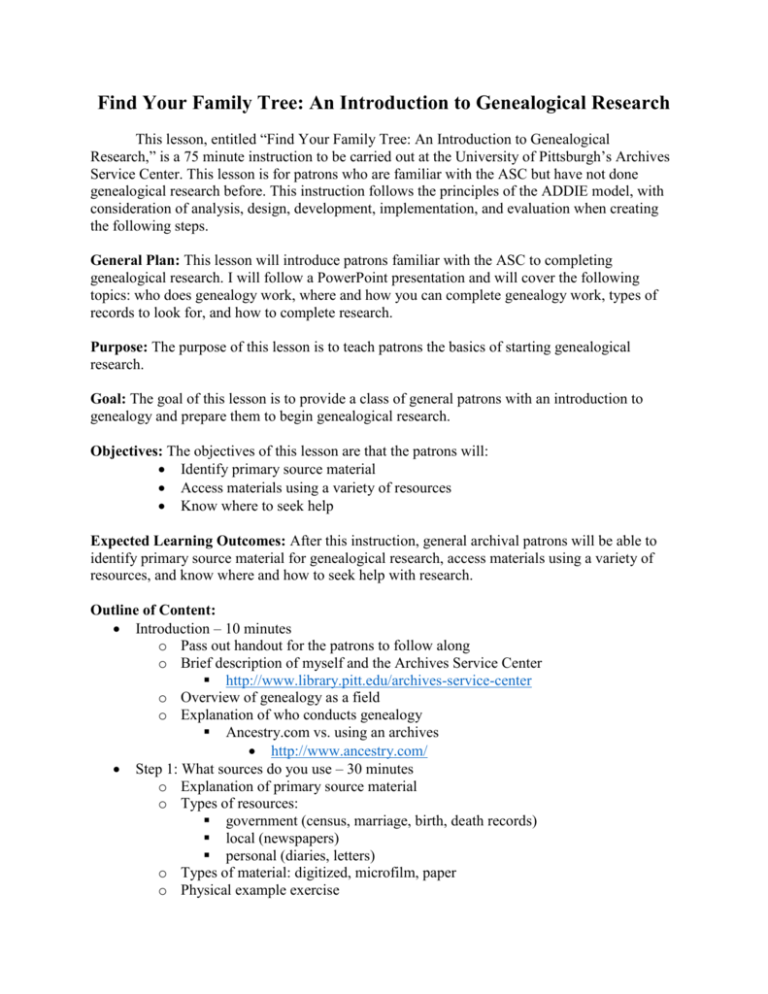
Find Your Family Tree: An Introduction to Genealogical Research This lesson, entitled “Find Your Family Tree: An Introduction to Genealogical Research,” is a 75 minute instruction to be carried out at the University of Pittsburgh’s Archives Service Center. This lesson is for patrons who are familiar with the ASC but have not done genealogical research before. This instruction follows the principles of the ADDIE model, with consideration of analysis, design, development, implementation, and evaluation when creating the following steps. General Plan: This lesson will introduce patrons familiar with the ASC to completing genealogical research. I will follow a PowerPoint presentation and will cover the following topics: who does genealogy work, where and how you can complete genealogy work, types of records to look for, and how to complete research. Purpose: The purpose of this lesson is to teach patrons the basics of starting genealogical research. Goal: The goal of this lesson is to provide a class of general patrons with an introduction to genealogy and prepare them to begin genealogical research. Objectives: The objectives of this lesson are that the patrons will: Identify primary source material Access materials using a variety of resources Know where to seek help Expected Learning Outcomes: After this instruction, general archival patrons will be able to identify primary source material for genealogical research, access materials using a variety of resources, and know where and how to seek help with research. Outline of Content: Introduction – 10 minutes o Pass out handout for the patrons to follow along o Brief description of myself and the Archives Service Center http://www.library.pitt.edu/archives-service-center o Overview of genealogy as a field o Explanation of who conducts genealogy Ancestry.com vs. using an archives http://www.ancestry.com/ Step 1: What sources do you use – 30 minutes o Explanation of primary source material o Types of resources: government (census, marriage, birth, death records) local (newspapers) personal (diaries, letters) o Types of material: digitized, microfilm, paper o Physical example exercise Activity – 15 minutes: 7 minutes - Patrons pair off and examine records (birth, death, etc) that would typically be used in genealogy o Partners determine what type they are and what type of information they could get from them 7 minutes – Partners return to group and discuss their findings. Step 2: Where to do you find resources – 15 minutes o Reiteration of Ancestry.com vs archives o Online resources National Chronicling America: http://chroniclingamerica.loc.gov/ Library of Congress: http://www.loc.gov/rr/genealogy/ State PA Historical & Museum Commission: http://www.portal.state.pa.us/portal/server.pt/community/genealog y/3183 Digitized material on local platforms Historic Pittsburgh: http://digital.library.pitt.edu/pittsburgh/ o Archives Genealogy a primary function of archives Differences between local, state, and national level Step 3: How to get help – 10 minutes o Start small & with what you already know Most likely will start locally, unless you already know a larger institution has records. Build to more institutions o Search collections online before going to an institution Prepared list of materials to see Recommended: contact archivists ahead of time o Always ask archivists Know more about collection Can recommend you to other collects Conclusion – 10 minutes o Quick review o Contact information: Katie Quirin, kmq7@pitt.edu, 412-648-3232 (ASC) o Pass out evaluation sheet Activities to guide the learner: PowerPoint presentation o Images of primary sources o Links to institutions/resources (LOC, Chronicling America, Historic Pittsburgh) Handout (below) with key points, links, and contact information. Activities to use for practice: During Step 1, patrons will be paired off and given some sort of government record (marriage, death, birth, etc) o They will work for 7 minutes to identify the type of document it is and how they think it would be useful for their research o Return to large group discussion and go over findings (7 min) Evaluation: A page given to patrons after completing the instruction to evaluate their experience in the lesson (below). Follow-up: One to two weeks after the instruction, follow up with participants via email to see if they would like more information about the ASC’s services or additional help with research. Find Your Family Tree: An Introduction to Genealogical Research 7:00 pm - Thursday, July 16, 2015 - Archives Service Center Genealogical research allows people to discover their families, their past, and more about themselves. In conjuncture with the class given at the Archives Service Center, this handout will give you the introductory steps to beginning genealogical research. What is Genealogical Research? o Genealogy is the study of tracing one’s line of decedents. Genealogical research uses archival material to determine ancestry. o It can be completed by hiring a professional genealogist, using subscription websites such Ancestry.com, or through independent research. What do you look for? o There are multiple types of records that will help you complete genealogical research. The major ones are: Governmental, examples: census, birth, death, marriage records Local, example: newspapers Personal, examples: diaries, letters Where do you find these records? o Repositories on the national, state, and local levels will have genealogical information. o Start local or from information you already know Example: You know your grandmother died in Pittsburgh, so start with institutions in Pittsburgh to find more. o Begin online and search collections to find where you need to physically go to do research. Library of Congress Genealogical Reading Room: http://www.loc.gov/rr/genealogy/ Chronicling America newspaper database: http://chroniclingamerica.loc.gov/ PA Historical & Museum Commission (State Archives): http://www.portal.state.pa.us/portal/server.pt/community/genealogy/3183 Archives Service Center: http://www.library.pitt.edu/archives-servicecenter Historic Pittsburgh: http://digital.library.pitt.edu/pittsburgh/ Need help? Contact me! Katie Quirin kmq7@pitt.edu Archives Service Center - 412-648-3232 Evaluation of Find Your Family Tree: An Introduction to Genealogical Research Please rate the instructor and lesson on a scale of 1 to 5 (5 being most successful): How well did this instruction educate you on beginning genealogical research? Rate: 1 2 3 4 5 Comments: Did you find the instructor well prepared and easily understood? Rate: 1 2 3 4 5 Comments: Were the lesson materials (handouts, presentation, and activity) helpful? Rate: 1 2 3 4 5 Comments: Do you feel confident in beginning genealogical research after this class? Rate: 1 2 3 4 5 Comments: Would you return to the Archives Service Center for future classes or research? Comments: Any final thoughts: If you would like a follow-up regarding this lesson or further help with research, please leave your contact information. Name: Email:
